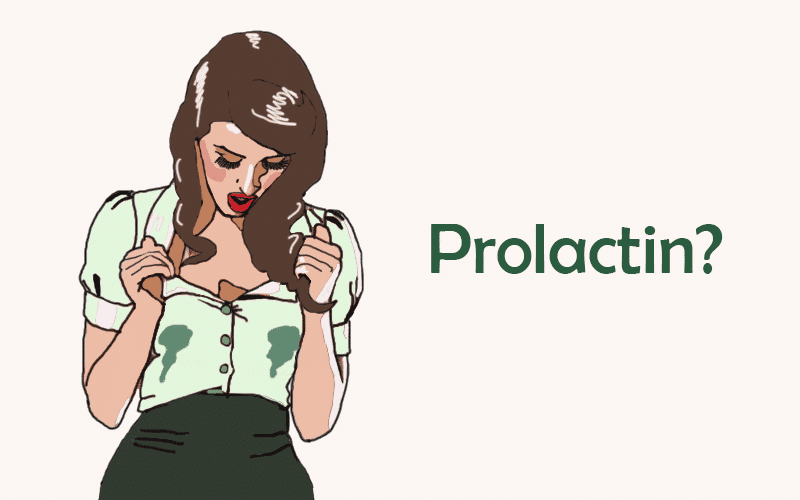Hyperprolactinaemia is a condition whereby there are higher than usual levels of prolactin, the hormone that is produced during breastfeeding to promote milk flow.1
Unusual levels of prolactin can indicate health problems that go beyond breastfeeding, including brain tumours.2
Normal prolactin levels are 60-480 mU/L, but in hyperprolactinaemia, levels can hit over 500 mU/L and go up into the thousands.
Symptoms associated with hyperprolactinaemia
- Periods stop (secondary amenorrhoea)
- Periods are infrequent or irregular
- Breast milk production/lactation occurs outside of normal circumstances
- Low oestrogen levels causing dry, irritated vagina, resulting in painful sex, loss of libido and changes to mood
- Lack of ovulation, resulting in infertility
- Osteoporosis, despite sometimes normal oestrogen levels
- Delayed puberty in children/adolescents
- If caused by a pituitary tumour, headaches, sinus issues, visual interference, and other symptoms associated with the brain and head
How prolactin secretion works
Prolactin production is in the pituitary gland in the brain, by special cells called lactotroph cells. Prolactin receptors are found in many areas of the body, with receptors in women found in the breast, liver, kidney (renal tubules), adrenal cortex, lungs, ovaries, lymph cells, heart and brain.3
Prolactin has many more effects on the body than just promoting milk production (galactogogue effects), however milk production is its main purpose.4
During pregnancy, oestrogen increases stimulate an increase in lactotroph cells.5 After birth, the loss of oestrogen and progesterone allows these cells to kick into gear, and within three or four days, milk production begins.
Ovulation is usually prevented during the first few months after birth while breastfeeding because follicle-stimulating hormone (FSH) and luteinising hormone (LH) are suppressed directly by prolactin. This means no periods.
Prolactin secretion may be stimulated by thyrotropin-releasing hormone (TRH) and oestrogen, so if a woman is suspected of having high prolactin, a thyroid test is important to rule out hypothyroidism.
Hypothyroidism causes TRH to be elevated, causing excess prolactin secretion and hyperprolactinaemia. Dopamine is a prolactin inhibitor.
Causes of temporary hyperprolactinaemia
- Pregnancy – increase in lactotroph cells
- Nipple stimulation – including in non-breastfeeding women
- Stress
- Excessive/intense exercise
- Eating
- Dehydration
- Sex and orgasm
- Prolactinoma
- Molar pregnancy
- Some drugs
Prolactinoma tumours
The most common cause of hyperprolactinaemia is a prolactinoma, a benign tumour on the pituitary gland in the brain that secretes prolactin. This type of pituitary gland tumour is a common cause of a loss of periods and reproductive dysfunction.6
Typical symptoms that go along with a prolactinoma include headaches, visual disturbances, sinus issues, and pituitary dysfunction. Prolactinomas are enhanced by oestrogen and inhibited by dopamine.7
A genetic predisposition may contribute to the development of prolactinomas, as there are familial links.
Drugs that can contribute to hyperprolactinaemia
- Dopamine receptor antagonists (many tranquilisers, antipsychotics)
- MAO inhibitors and tricyclic antidepressants
- Calcium-channel blocker (Verapamil)
- Anti-ulcer drugs (Pepcidine, Tagamet, Tazac, Zantac)
- High blood pressure drugs (Aldactone, Aldomet)
- High dose oestrogen oral contraceptive pills
- Opiates, cocaine, alcohol, in particular beer
Perimenopause and menopause – extra issues
There are some extra risks associated with hyperprolactinaemia in women who are menopausal or nearing menopause due to the vasoconstrictive effect of prolactin. Prolactin may play a role in blood pressure and cardiovascular health.
Treatment of hyperprolactinaemia
Treatment will depend on the cause, which must be thoroughly investigated to establish causation.8
References
- 1.García Cano AM, Jiménez Mendiguchía L, Rosillo Coronado M, et al. Causes of hyperprolactinaemia in the primary care setting: How to optimise hyperprolactinaemia management. Endocrinología, Diabetes y Nutrición. Published online December 2022:771-778. doi:10.1016/j.endinu.2022.01.011
- 2.Kiyani M, Chua MWJ. It Keeps Getting Bigger: A Patient With a Hypothalamic Tumor and Hyperprolactinemia. Cureus. Published online March 18, 2025. doi:10.7759/cureus.80793
- 3.Egli M, Leeners B, Kruger THC. Prolactin secretion patterns: basic mechanisms and clinical implications for reproduction. REPRODUCTION. Published online November 2010:643-654. doi:10.1530/rep-10-0033
- 4.Phillipps HR, Yip SH, Grattan DR. Patterns of prolactin secretion. Molecular and Cellular Endocrinology. Published online February 2020:110679. doi:10.1016/j.mce.2019.110679
- 5.Samperi I, Lithgow K, Karavitaki N. Hyperprolactinaemia. JCM. Published online December 13, 2019:2203. doi:10.3390/jcm8122203
- 6.Soto-Pedre E, Newey PJ, Bevan JS, Leese GP. Morbidity and mortality in patients with hyperprolactinaemia: the PROLEARS study. Endocrine Connections. Published online November 2017:580-588. doi:10.1530/ec-17-0171
- 7.Romijn JA. Hyperprolactinemia and prolactinoma. Handbook of Clinical Neurology. Published online 2014:185-195. doi:10.1016/b978-0-444-59602-4.00013-7
- 8.Chen AX, Burt MG. Hyperprolactinaemia. Aust Prescr. Published online December 4, 2017:220-224. doi:10.18773/austprescr.2017.060







